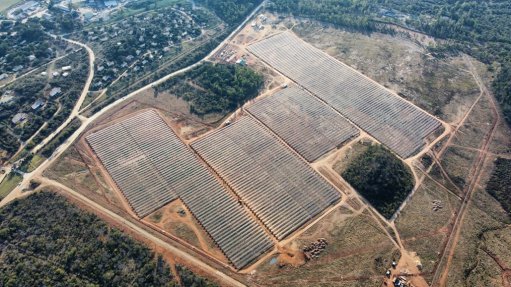
HIGH VOLTAGE To combat power quality issues, Caledonia has installed transformers to protect the mine from voltage spikes, thereby mitigating costly damage to sensitive electronic equipment
Amid energy-related challenges facing Zimbabwe, including power constraints and quality of power supply, gold producer Caledonia Mining has taken measures to shield its flagship Blanket gold mine from the national grid.
These efforts have meant that the gold producer commissioned a 12.2 MW solar plant on February 2, to the value of $14-million, to improve the quality and security of the electricity supply to the mine.
Previously, the company would use about 800 000 ℓ of diesel in a quarter to operate its 18 MW generator sets, which was not feasible, especially amid Russia’s invasion of Ukraine and the consequential escalation in fuel prices, explains Caledonia CEO Mark Learmonth.
While the solar project has provided all of the baseload requirements for the Blanket mine during daylight hours, the company also started importing electricity directly from Zambia and Mozambique in April, which Learmonth says is more cost-effective.
Further, to combat power quality issues, Caledonia has also installed transformers to protect the mine from voltage spikes, thereby mitigating costly damage to sensitive electronic equipment.
“We have spent quite a substantial amount of capital on solar and transformers, but now that the project is completed, we have been able to insulate ourselves from the electricity problem. We are now working on power-factor correction and increasing the usable amount of incoming power that we pay for.”
Business finance and administration can also prove challenging in the Zimbabwean mining sector.
Despite challenges, however, he attributes Caledonia’s success in Zimbabwe to the company’s continuous investment in the mining industry.
Learmonth tells Mining Weekly that success in the sector has required ensuring that the Blanket mine remains in a “virtuous circle” of making enough capital to maintain operational integrity while absorbing capital costs needed to mitigate issues such as power constraints or delays in transferring money.
“This is where mining companies in Zimbabwe can often fall short; they are often unable to earn enough capital to exit the vicious circle of dealing with challenges in the sector. You cannot just hope to start mining without ensuring that you are able to overcome these issues.”
Moreover, he explains that worker and community relations, as well as reduced interference from government, have been positive aspects in terms of mining, which is evident in how the Blanket mine is 10%-owned by the local community who receive regular dividend payments.
“It is important to understand how the sector operates in terms of knowing the right buttons to push and the right levers to pull. Zimbabwe is a misunderstood jurisdiction but, at some point, we hope to allay people’s concerns about the country,” Learmonth concludes.